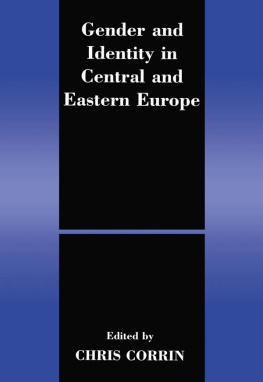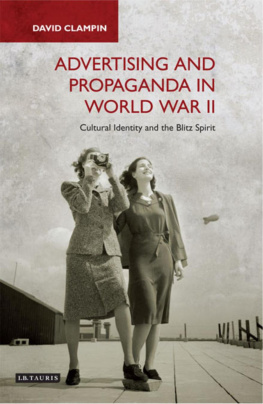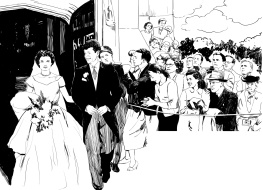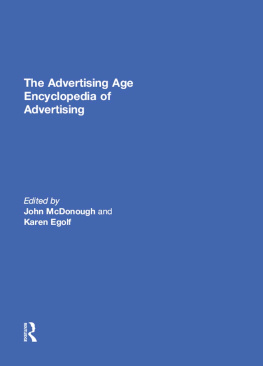Advertising and Identity in Europe
The I of the Beholder
Edited by
Jackie Cannon
Patricia Anne Odber de Baubeta
Robin Warner
First Published in Great Britain in Paperback in 2003 by
Intellect Books, PO Box 862, Bristol BS99 1DE, UK
First Published in USA in Paperback in 2003 by
Intellect Books, ISBS, 5824 N.E. Hassalo St, Portland, Oregon 97213-3644, USA
Published in Hardback in Great Britain in 2000 by Intellect Books, Bristol, UK
Published in Hardback in USA in 2000 by Intellect Books, Portland, OR, USA
Copyright 2000 Intellect Ltd
All rights reserved. No part of this publication may be reproduced, stored in a retrieval system, or transmitted, in any form or by any means, electronic, mechanical, photocopying, recording, or otherwise, without written permission.
| Consulting Editor: | Robin Beecroft |
| Copy Editor: | Jeremy Lockyer |
A catalogue record for this book is available from the British Library
Electronic ISBN 1-84150-872-1/ISBN 1-84150-037-2
Printed and bound in Great Britain by Antony Rowe Ltd, Eastbourne
Contents
J. Enrique Bign
Jackie Cannon
David Head
P. M. Crompton & R. McAlea
Batrice Damamme-Gilbert
Yvonne McLaren
Robin Warner
Cristina gua-Mel
Helena Buffery
Patricia Odber de Baubeta
Sandi Michele de Oliveira
Nickianne Moody
Hugh ODonnell
Anne M. White
Acknowledgements
The editors wish to express their most sincere thanks to all the representatives of the various institutions which have made a significant contribution to both the original conference event in May 1999 and the subsequent publication of this volume. Special thanks go to Professor Trevor Dadson of the Department of Hispanic Studies at the University of Birmingham who supported the hosting of the one-day conference as well as this publication; Professor Sen Hand of the School of Languages at Oxford Brookes University and Professor Nicholas Round of the Department of Hispanic Studies at the University of Sheffield as well as to Professor Michael Scriven of the Faculty of Languages and European Studies at the University of the West of England. We are greatly indebted also to Salvador Estbanez at the Instituto Cervantes in Manchester who embraced the opportunity to invite Professor J. Enrique Bign from the Marketing Department at the Universitat Jaume I to speak at the conference, thus allowing us to enhance the inter-disciplinary nature of the event. Further thanks are extended to the Association for Contemporary Iberian Studies which, through regular conference events, has long encouraged the exchange of ideas and has provided a forum for common interests to be explored.
We thank also colleagues, the essays of a number of whom are included in this volume, who confirmed the importance of this area of study by either offering papers at or attending the conference and who subsequently encouraged us to proceed with this publication. Those whose contributions are included are further thanked for the conscientiousness with which they have collaborated with the editors in submitting, reviewing, revising and finalising their papers within the required time-scale.
Many other people have also played a substantial part in allowing the editors to move forward with this volume. Amongst those who deserve special thanks are Hilary Rollin, John Jepson and D.W. Baubeta.
Preface
This volume of essays had its genesis in an international symposium held at the University of Birmingham in May 1999. While the organisers were well aware that advertising and identity were topic areas which were each in their own right well-established, the opportunity to explore the interface was to produce an overwhelming response in terms of papers offered, audience attendance and participation, and subsequent feedback and requests for further information. The symposium attracted contributions from a wide range of countries, languages and disciplines. The latter included Applied Language Studies, Cultural Studies, Gender Studies, Marketing, Media Studies and Translation Studies. Participants came from Denmark, England, France, the Irish Republic, Portugal, Scotland and Spain. Texts under scrutiny were variously in Catalan, English, French, German, Portuguese and Spanish.
The present volume is not the published proceedings of the conference. Rather, it represents in all cases a process of reflection on and further development of ideas originally presented in that forum. The explicit speculation that is characteristic of conferences has been transformed into a more thorough exploration, documentation and application of scholarly apparatus. Having initially tested their ideas, many of the contributors have benefited from the response of colleagues as an aid to reflection, revision and consolidation. As a result of this evolutionary process, the narrow thematic groupings of the conference have been revised and refocused.
Our definition of advertising is not restricted to texts intended to sell products and services, but is understood to include promotional texts of all kinds whose function is to inform and persuade. Whatever we think about advertising, it has to be recognised that it is a pervasive part of daily life; we are surrounded by advertising texts demanding our attention. In addition, we encounter a variety of texts which, at first sight, appear to be of another type, but in fact fulfil many of the functions, overt and covert, of advertising.
Advertisers have long been aware of the need to target specific groups of consumers and to appeal to them precisely in terms of their sense of membership of such groups. Our post-industrial society is characterised by greatly altered work and leisure patterns as well as a weakening of national and communal frameworks for collective identity. The interrelated questions Who am I? Who are we? are becoming increasingly difficult to answer. We would maintain that theories relating to identity have thus become central to current advertising practice, which not only reflects but actively makes use of such concerns. The papers in this volume explore the different constructions of regional, national, social and sexual identities exploited by advertisers to render their messages effective.
The fourteen contributions collected here share the underlying premise that advertising is inherently and necessarily enmeshed in the broad cultural experience of those at whom it is aimed. The issues they address range from the marketingeffectiveness of identity factors and consumers changing awareness of such elements to the role of advertising in shaping as well as reflecting these changes and its contribution to perceptions of social, professional and gender roles. The validity of advertisements as cultural artefacts and the contribution to processes of signification of visual and verbal interplay are also considered.
The papers have been grouped in thematic clusters, although, in accordance with the inter-disciplinary nature of the initial conference, inevitably there will be overlap. A number of the contributors bring a neutral analytical perspective to the aspects they analyse, examining broad trends and incidences of noteworthy features, assessing the efficacy of different options or highlighting the creative and stylistic qualities of the promotional texts. Others adopt in principle a critical stance towards the function of advertising, either in itself or as an important component of cultural mediation in general, drawing attention to the way promotional discourse inevitably favours certain positions in the ideological contests characteristic of the postmodern age.











